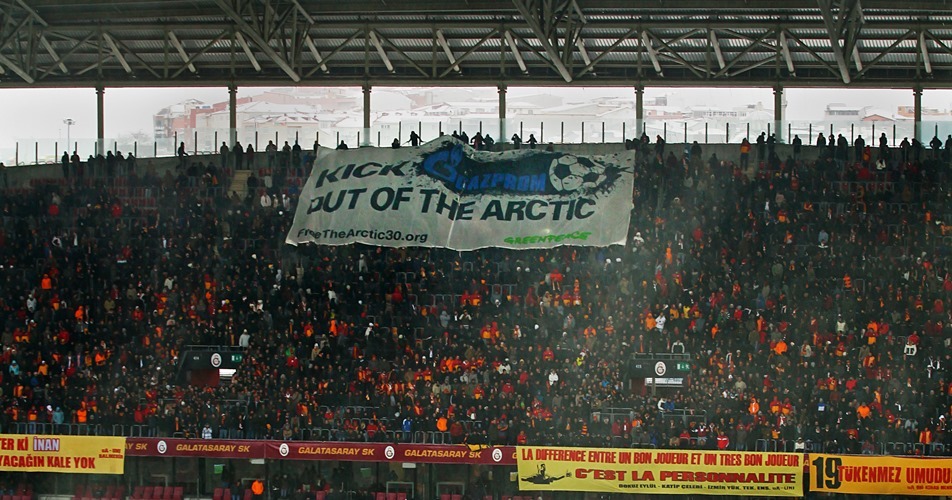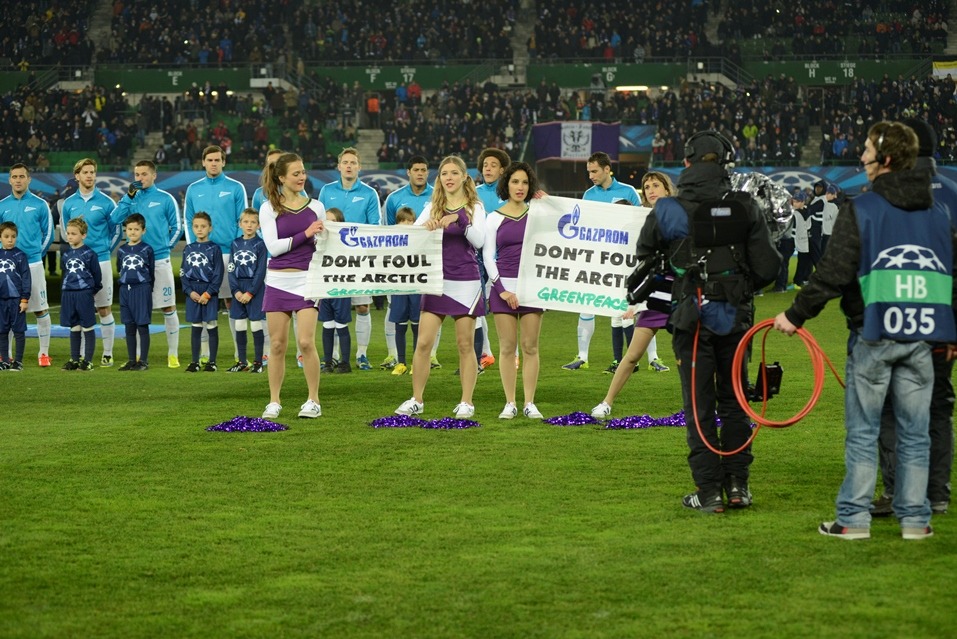Greenpeace vs Gazprom: The Conclusion - Part 5
Greenpeace vs Gazprom: The Conclusion - Part 5

Greenpeace vs Gazprom: The Conclusion - Part 5
A tactical analysis of the utilisation of environmental tifosi to combat Arctic drilling in the Champions League’s most important fixture. Read the whole series here.
By Jake Cohen
With regards to quantifying the success Greenpeace has achieved thus far, I asked Ian Duff if Greenpeace had specific figures on how many donations the organisation received as a result of the Champions League campaign, but Greenpeace doesn’t track donations like that.
Admittedly, trying to quantify the success of social activism in terms of donations received is glossing over the bigger picture quite a bit, and the Champions League campaign targeting Gazprom is a subset of a much bigger campaign, which is the campaign against Arctic drilling.
In fact, Duff went as far to say that Greenpeace simply doesn’t care about donations in relation to specific campaigns, and made it clear that the organisation does not hurt for funding. He explains that “people donate to Greenpeace because of our vision and our values, rather than based on an individual campaign.”
The best way of measuring the success of this campaign is likely in the number of people Greenpeace has been able to reach. As a result of the Champions League campaign, millions of people have been, at the very least, made aware that there is something contentious going on in the Arctic circle.
It’s difficult to quantify exactly how many people were spurred to dig any deeper than that, but as long as football supporters know that there’s something going on in the Arctic and the door will always open should people want to learn more about the issues, Greenpeace would likely chalk the campaign up to a victory.
With Didier Drogba returning to Stamford Bridge, Barcelona and Bayern Munich attempting to hold on to two-nil leads against Manchester City and Arsenal, and Zlatan being Zlatan, there is no shortage of excitement on the pitch during the knockout round. Off the pitch, Greenpeace will likely continue to utilise clever methods to draw our attention to their campaign during any lull in play.
While I’m certainly not privy to any future plans, if their performance in the group stage is any indication, Greenpeace will likely be in top form during the knockout rounds, and any developments will be worth paying attention to for the spectacle alone. If the performances from the environmental tifosi wins some new supporters, then all the better from their perspective.
That said, given the extraordinary amounts of untapped resources in the Arctic circle coupled with the Russian government’s history of being unwavering on some very unpopular social policies, Gazprom is unlikely to be deterred by either the embarrassment caused or any external pressure to cease their activities in the Arctic generated by the campaign.
Just like a football manager refusing to change tactics in the face of pressure from supporters and the media prior to a big match, there is simply too much at stake for Gazprom to be swayed by the peanut gallery.
Of course, just because it’s unlikely that Gazprom and the energy industry at large will be persuaded to stop exploiting the Arctic anytime soon, it doesn’t mean that it’s impossible. Duff says that “Greenpeace’s goal is to chase the arctic oil companies to every stage that they are on. Wherever they go, wherever they are trying to build their standing and reputation within our community, we want to be there with an alternative message, which is ‘these companies shouldn’t be drilling in the Arctic, and we shouldn’t be allowing them to that.“
As James Baldwin, one of America’s greatest writers, once penned “The world changes according to the way people see it, and if you can alter, even by a millimetre, the way people look at reality, then you can change the world.” Baldwin’s prose aptly summarises Greenpeace’s philosophy with this campaign.
If enough people buy into Greenpeace’s message, then eventually their message will become a reality that Gazprom will have to face. Greenpeace knows it can’t do it alone, and is knocking on everyone’s door for help. They’re knocking especially loudly with their Champions League campaign, and it will be interesting to see how many football supporters answer the door.








